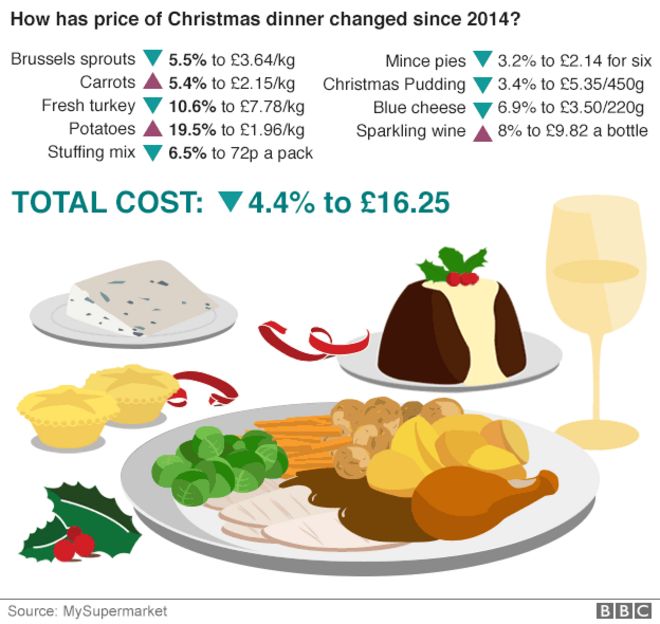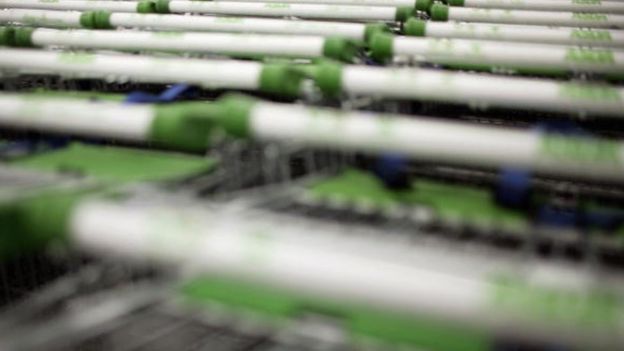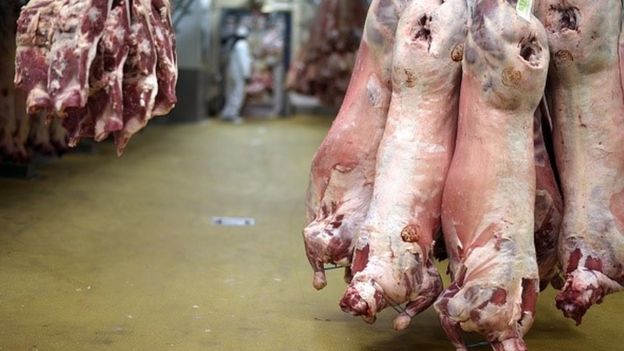
Cooking up a festive feast is going to be cheaper this year, and many of the key ingredients are selling at the lowest prices seen for years.
Fresh turkey and Brussels sprouts are the cheapest they’ve been since 2011. Stuffing, Christmas pudding and mince pies are all selling, on average, for less this year than last.
So consumers can feel a little less guilty for having an extra helping this Christmas.
The findings, from price comparison site MySupermarket, are based on average prices across branded and unbranded goods in the major food retailers in the UK.
‘Price war’
The comparison site believes it is competition between these major retailers that is pushing prices lower.
“There is a price war going on – with the big five supermarkets fighting to get customers into their stores,” says Kim Ludlow, managing director of MySupermarket.
But their research also reveals the benefits of shopping around, with some of the most popular items – like puddings or turkeys – being discounted in a store. But those savings can then often be cancelled out with other items becoming more expensive.
 Image copyrightGetty Images
Image copyrightGetty Images“The supermarkets are shouting so much about being the cheapest, that it is becoming white noise – some consumers simply do not believe it any more, and they want to check it out for themselves,” Mr Ludlow adds.
The supermarkets’ ability to cut costs are down to fundamentals.
Some of the key ingredients in shoppers’ trolleys have been coming down in price. A dozen eggs will cost an average of £2.74 today compared with £3.00 in 2011.
Butter is down from £1.54 to £1.49 over the same period of time. Milk is selling at cheaper prices this Christmas than last year.
And this ties in to a wider global picture.
Cheese costs
Food, like other commodities such as oil or gold, is traded around the world, and prices are governed by supply and demand.
A current over-supply in the dairy industry has pushed milk prices down by more than 60% in the past two years.
China’s appetite for dairy products is not what many in the industry expected, and there is also the effect of sanctions imposed by Russia against EU imports. It means there’s more milk, and its by-products, sloshing around than required.
That has a knock-on effect too. A slice of festive Stilton cheese is a pinch cheaper this year.
“The price of milk is important to us, and we have to buy a lot of milk to make our cheese,” says Robin Skailes, from Cropwell Bishop Creamery.
“So the prices are bearing on our costs, plus the labour costs. Stilton is a hand-made cheese – there’s a lot of work that goes into it and so that does form quite a high proportion of our costs.”
So, even though the costs of production are increasing, the retail price is coming down.
‘Bumper year’
Mr Skailes says 98% of cheese is sold in supermarkets and that there are price wars going on at the moment.
He says that with Stilton “being a favourite Christmas product”, it might be used by supermarkets to entice people into stores.
The current environment is not just affecting dairy. Anyone wanting an extra couple of pigs-in-blankets shouldn’t feel the squeeze – in their wallet anyway.
Global pork prices are the lowest they’ve been since 2008.
 Image copyrightGetty Images
Image copyrightGetty ImagesMeanwhile, the weather can also have an impact.
“We’ve had a bumper year this year,” says David Read of food research firm Prestige Purchasing.
“The weather has been not too hot, not too cold. It’s been not too wet and not too dry. And so farmers have found themselves with yields that are 10% to 15% higher.”
But he says that current conditions are also to do with a favourable pound to euro exchange rate – meaning UK importers of meat and fish can get more for their buck on the continental mainland.
“I think we can be pretty confident that we’re going to have low food inflation for at least the next year,” he adds.
Anyone looking for a frugal Christmas, it seems, should load up on meat and sugar, and leave the vegetables alone. Potatoes have almost doubled in price at retailers since 2011.
But it is not all good news for shoppers. Some items are more expensive.
Sparkling wine is up to an average of £9.82 a bottle – more than £1 up on 2011. And Christmas pudding prices have risen steadily over the years – although on average they should cost you a little less this Christmas than last.
[Source:-bbc news]
